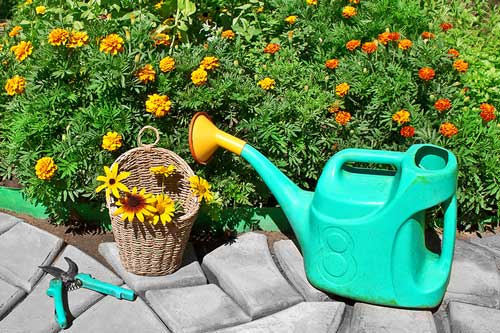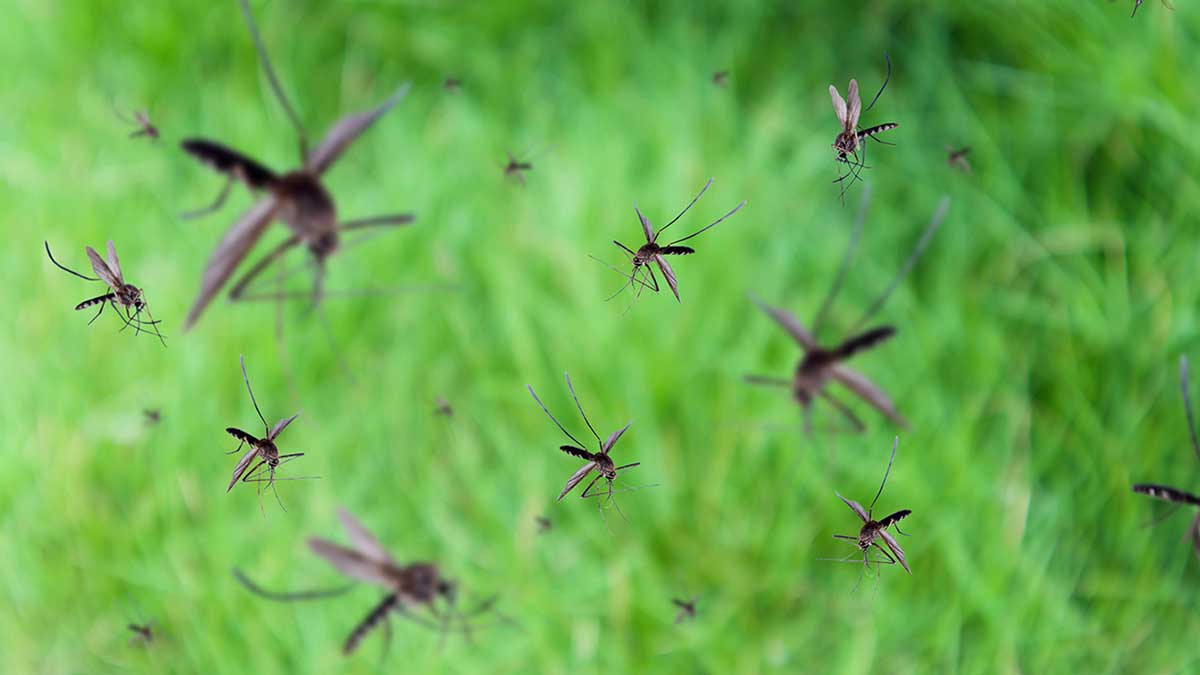Mosquitoes can quickly turn summer fun into an itchy, uncomfortable experience. More than just annoying, these pests can transmit serious illnesses like West Nile virus and Zika. That’s why learning how to prevent mosquitoes in your yard is an important step in protecting your family and enjoying the outdoors. Below are five proven methods to mosquito-proof your lawn, naturally and effectively.
1. Eliminate Standing Water Around Your Yard

Standing water in a lawn creates the ideal breeding ground for mosquitoes. Poor drainage, heavy thatch, or compacted soil can cause puddles to linger after rain; a key area to fix to prevent mosquito infestations.
If you’re wondering how to prevent mosquitoes in your yard, your first priority should be eliminating standing water. Mosquitoes lay their eggs in stagnant water, and even small amounts — like what collects in a bottle cap — can serve as a breeding ground. Their larvae hatch and thrive in these tiny pools, making regular yard inspections essential.
Tips:
- Dump out water from flowerpots, toys, and tarps.
- Empty birdbaths and pet water bowls every few days.
- Check for clogged gutters or low spots in the lawn after rain.
- Inspect grill covers and plant trays where rain can pool.
- Identify soggy patches of lawn and improve drainage or grade the soil.
- Aerate compacted soil to reduce surface pooling after watering.
Why this works:
According to the CDC, mosquitoes spend about 75% of their life cycle in water. Removing these habitats significantly reduces their ability to reproduce.
2. Maintain Your Lawn and Landscaping Regularly
Keeping your lawn trimmed and your landscaping tidy isn’t just for curb appeal — it also reduces mosquito activity. If you’ve ever asked, what attracts mosquitoes to my yard?, the answer often lies in shady, overgrown, and humid areas. Tall grass and dense shrubs create ideal resting spots for mosquitoes during the heat of the day.
Tips:
- Mow your lawn weekly to reduce shaded areas.
- Trim hedges, trees, and other dense vegetation.
- Remove leaf litter, yard debris, and grass clippings.
- Rake under decks and around fences where moisture collects.
Why this works:
According to the Mississippi State Department of Health, mosquitoes seek out damp, shaded hiding spots. Proper lawn maintenance limits their shelter and reduces your risk of bites.
3. Dethatch Your Lawn to Improve Airflow and Drainage
Dethatching is a lesser-known but highly effective mosquito control step. Over time, lawns build up a layer of dead grass and roots called thatch. Thick thatch traps moisture and heat — making it an ideal hiding and breeding zone for mosquitoes.
If you’re researching does lawn dethatching help control mosquitoes, the answer is yes. It improves airflow, soil drainage, and removes the damp conditions mosquitoes love.
Tips:
- Use a dethatching rake or rent a power dethatcher once per season.
- Check for signs like spongy turf or thinning grass.
- Water and fertilize afterward to promote healthy regrowth.
Why this works:
Dethatching removes mosquito-friendly hiding spots and promotes a drier, less hospitable environment. It also helps water absorb into the soil more effectively.
4. Add Mosquito-Repelling Plants to Your Landscape

Marigolds are more than just vibrant summer flowers. Their strong scent helps repel mosquitoes naturally. Plant them near patios or walkways to create a colorful, bug-resistant barrier.
One of the most natural ways to control mosquitoes is by adding plants they can’t stand. These plants release oils and fragrances that confuse mosquitoes’ ability to detect carbon dioxide and body heat — two things that attract them to humans.
If you’re looking for safe, natural solutions, these mosquito-repelling plants are a great start:
Recommended plants:
- Citronella grass
- Basil
- Marigolds
- Catnip (10x more effective than DEET)
- Lemongrass
- Rosemary
- Lavender
- Peppermint
Tips:
- Place potted plants near patios and entryways.
- Line walkways or decks with repellents like marigolds or citronella.
- Crush the leaves occasionally to release more scent.
Why this works:
The strong natural scents mask human odors and make it more difficult for mosquitoes to find you. A well-planned garden can be both beautiful and functional.
5. Use Outdoor Fans and EPA-Approved Repellents
Mosquitoes are weak fliers and hate wind. Creating air movement with fans can help keep them away from patios and outdoor dining areas. When combined with topical or yard-safe repellents, this method offers both active and passive protection.
Tips:
- Set up oscillating fans near seating or grilling areas.
- Install ceiling fans in covered porches.
- Use citronella candles or torches to disrupt scent signals.
- Choose EPA-registered repellents like oil of lemon eucalyptus for added protection.
Why this works:
Wind interferes with mosquito flight and scent detection. Paired with repellents, it creates an environment they prefer to avoid.
Protect Your Yard With Professional Mosquito Control
While these tips help reduce mosquito populations, sometimes a more aggressive solution is needed. At Aspen Lawn & Pest Control, we offer professional mosquito treatments customized to your property. Our applications target mosquito breeding grounds and adult habitats without harming pollinators or pets. Contact us today for your Free Estimate to schedule your mosquito treatment and reclaim your backyard this season.


Socials